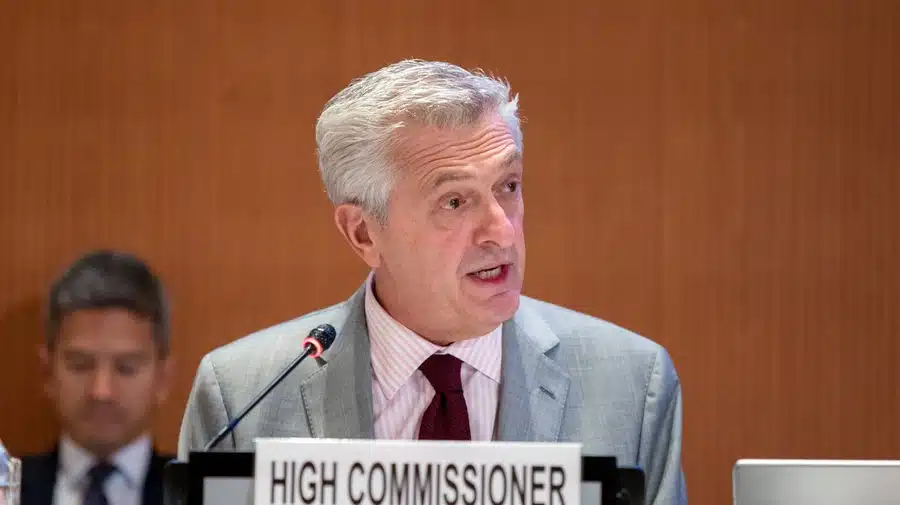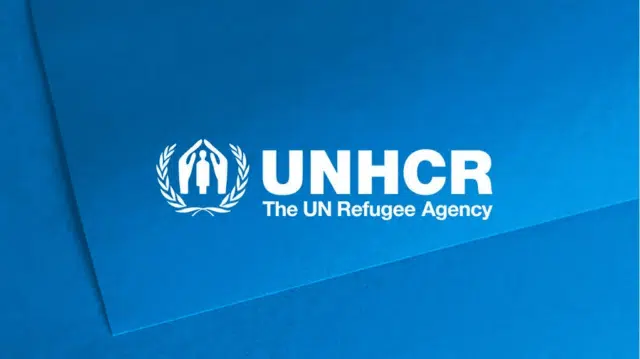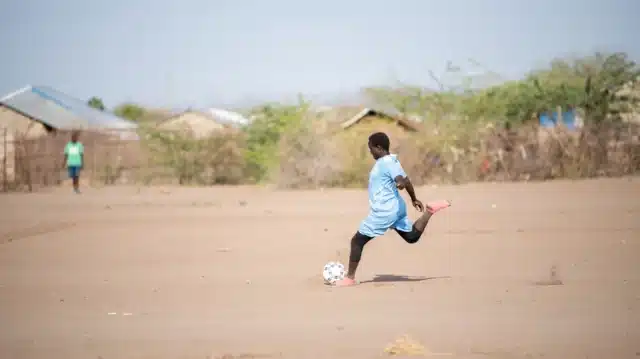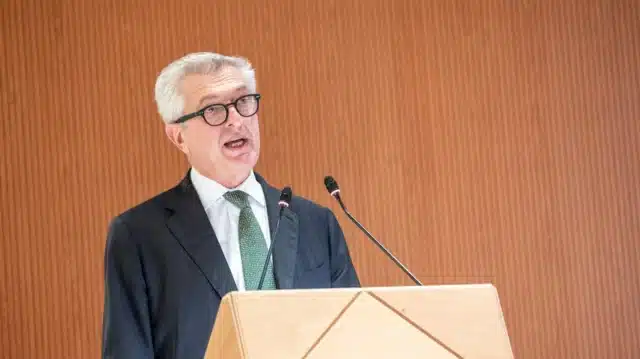
UN High Commissioner for Refugees, Filippo Grandi, speaks at the closing of UNHCR’s annual Executive Committee meeting. © UNHCR/Susan Hopper
Thank you, Madam Chair.
The Universal Declaration of Human Rights sets out in Article 1 that, I quote, “all human beings are born free and equal in dignity and rights. They are endowed with reason and conscience and should act towards one another in a spirit of brotherhood.”
Not once in this short and fundamental document does the word “except” appear. No right is for all “except” this religion, or that race, or any other application to some people but not others.
But 75 years after the Universal Declaration of Human Rights was adopted by the United Nations, violations of human rights, of international humanitarian law, of refugee law and other international legal norms are on the rise around the world.
In the past days alone, a camp for displaced people in Myanmar was bombed; violence flared again in eastern Democratic Republic of the Congo; people fled brutal attacks in the Sahel. War raged in Ukraine as it did in Sudan, killing and displacing countless more. And, of course, the devastating and unrelenting cycle of conflict in the Middle East has exploded once again; the news and images of civilians killed in Israel and Gaza, including at least twelve United Nations colleagues in the Gaza Strip, are intolerable. I echo the Secretary-General’s calls, including the need to protect all civilians and civilian infrastructure in respect of international humanitarian law and – impossible as it may appear as we speak – for all to step back from the brink, stop this war and reconsider a much too elusive path to peace.
At this dangerous time, speaking as I do on behalf of people that are often victims of hate campaigns, I believe it is also crucial that we ensure that there is no space or tolerance for hate speech, including in its abhorrent manifestations of anti-Semitism and Islamophobia.
Like many of us, I am anguished by the very real risk that rhetoric, acts, or errors made in the fog of war could lead to an expansion of conflict across the Middle East and beyond.
We know well that the human consequences of this and other conflicts are incalculable, in a context in which all major humanitarian agencies – not only UNHCR, but also the World Food Programme, the International Committee of the Red Cross, and others, including UNRWA – are stretched to the limits in terms of capacity, resources, and exposure to political and security constraints.
New and ongoing wars are spreading and getting closer to each other in a jigsaw that is dangerously closing. Additional, deadly pieces can only cause more needs, suffering, or displacement at a time when none of us – none of us – are sufficiently resourced to deal with the humanitarian consequences. We are very close to breaking point. And then what?
We are already struggling to respond to the crises mentioned above and many more, such as the response to not one but two earthquakes that have struck the Herat region of Afghanistan during our deliberations. Sympathies are nice to express, but our response is what will save lives and alleviate some – just some – of the suffering.
Madam Chair,
In this sombre context, I wish to thank all of you for having kept focus also on issues of our direct concern. Some 140 delegations have taken the floor since Monday. We heard important, positive statements that will help guide our work and strengthen our resolve in the service of some of the world’s most vulnerable people. I have listened very carefully to you all. I have tried to respond to each of you, as have the Deputy High Commissioner and the Assistant High Commissioner for Protection and other colleagues for specific segments of our meeting.
I have been struck – positively – by the number of references to upcoming pledges to be made at the Global Refugee Forum. I am particularly impressed by those of the major host countries. I hope that even more host countries will endeavour to make policy pledges, especially those that further the inclusion of refugees. And I hope that these engagements will be adequately matched by others, through a pledging system that is designed to highlight responsibility sharing.
For let’s remember that the point is to ensure that we share the burden and responsibility for refugees across the entire international community. Funding the response cannot be left to just a handful of donors. But even more so, we cannot leave – as was so eloquently put by the Africa Group – a handful of hosts to receive, protect and care for the vast majority of the world’s refugees. I appeal in particular for much more, please, from those that are neither major hosts nor major donors.
I have heard countless reaffirmations of support for international conventions. This was capped off by the statement from Minister Guadalupe from São Tomé e Principe who announced his government’s intention to accede to four conventions! I encourage others to also accede to instruments not yet ratified. Because accession to the 1951 Convention and its Protocol, as well as the Statelessness Conventions, are very important, especially in the challenging human rights environment I have described.
I have heard (and appreciate greatly) your support for UNHCR staff around the world. I wish to add my voice to those who have expressed respect and admiration. We are strong because of our colleagues, particularly those working alongside our partners in high-risk situations, as rightly stressed by the Chair of our Staff Council, whom I thank.
I also heard how much they can do – our staff, their partners – when they are adequately resourced. The intervention from Minister Buzu from Moldova highlighted this far more eloquently than I can, but it is an example that when UNHCR is resourced, we can be of great support to governments and to the entire international community and can work on solutions, or at least self-reliance approaches, which actually decrease the dependence on financial resources. I therefore repeat my appeal – in the strongest of terms – that donors do more to help close the growing and dangerous gap between needs and available resources and do so in a more predictable and flexible manner.
That means, as was raised by Sweden and others, more multi-year funding. It means, as was equally underlined by the Netherlands, Denmark and many others who do that, as well as Uganda, Zimbabwe, Ethiopia and a number of host countries, the need for flexible, unearmarked funding. This will allow, first and foremost, more equitable responses to different crises that many rightly requested. I wish, in particular, to echo and underscore the calls from Uganda for resources that allow us to meet the needs where they are greatest.
Furthermore, as the Deputy High Commissioner so correctly stated, “earmarking introduces inefficiencies”. It pre-determines, irrespective of needs, where resources are allocated. It makes it more difficult for us to ramp up and scale down operations. It also leads to wholly unnecessary tensions and divisions amongst all of you. As my friend, Minister Onek from Uganda, said (I quote) “hosts cannot earmark who they receive”.
I therefore reiterate my heartfelt thanks for the trust placed in UNHCR by donors of unearmarked funds, a club to which I am so happy to welcome Angola, which announced its first unearmarked contribution to UNHCR. Thank you!
And to further prove that trust is well placed, allow me to assure you again, as the Deputy High Commissioner also did, that we are prioritizing – every single year, every single operation, every single intervention. We do it because it is important. We do it also because only about 50 per cent of the budget (and this year maybe less) is funded. This sometimes painful prioritization, plus our efforts to make ourselves even more efficient, will continue. But we must also recognize that doing more with less can be stretched and stretched – but at some point, it becomes impossible without becoming unable to fulfil the mandate you have given to us.
Madam Chair,
I will uphold the humanitarian principles I noted at the outset, including the independence so many of you spoke to and supported and encouraged, and I thank you for those comments.
But I wish to be clear. Sometimes you will like my independence. Sometimes you will not. This said, I will always constructively speak the truth to you and listen carefully to all your concerns and positions. That is the nature of my job and the responsibility that you – Member States – have entrusted to UNHCR. I am glad that so many of you recognized that, and I remain committed to continuing that inclusive and transparent dialogue with all.
While a number of – especially African – delegations raised concerns with the climate emergency, and its impact on population movements, I would have liked to hear more on the importance of addressing this urgent issue, specifically through the inclusion of those displaced in national climate action plans; we must give displaced people greater say in climate strategies and in the allocation of much-needed resources. I do hope that this message will be received in all your capitals. Please help us ensure that it is made a priority during the upcoming COP 28 meetings, which I will attend along with our humanitarian and development partners.
Madam Chair,
I thank you and our First and Second Vice Chairs for your stewardship of this meeting. I am indebted to you, dear Kadra, for your good advice and much-appreciated friendship, and for all your good work, including in your national capacity. My congratulations to Ambassador Katharina Stasch on her election as Chair and to Ambassador Christian Espinosa Cañizares from Ecuador for his election as First Vice Chair. I also congratulate the rest of the bureau on its election, including our new Rapporteur Mary Namono Kibere of Uganda and thank our outgoing Rapporteur Sumair Gul of Pakistan. I look forward to working with the new bureau, with you Katharina and of course also with others that are leaving the bureau as they go back to their national capacities.
I cannot conclude without acknowledging with the deepest gratitude our Secretariat, led by Anne Keah, as well as all the support staff who made this event possible, from the camera crews, the IT support, the sound teams, and many others, including of course the interpreters in the booths high above us. My thanks also, especially, to Karin de Gruijl who has been a pillar in the Secretariat during my time as High Commissioner and who is retiring before our next Executive Committee meeting.
Madam Chair,
Around the world, displacement is continuing to rise, despite our every effort and focus on protection, assistance, and solutions. These challenges are too big for any one of us to address alone and require us to come together: to help those affected by violence and the displaced; to ease pressure on host countries and communities; to enhance refugee self-reliance; to expand third-country solutions; and support conditions in countries of origin to facilitate return in safety and dignity.
But we will be back together in two months for the Global Refugee Forum. It comes at a difficult moment for the world and especially for the refugees.
They will be watching us. They will hear our words. They will want to see action, including putting aside – to the greatest extent possible – our divisions. I have spoken much about the need for unity, but let me reiterate my appeal once more.
The world today is tragically one step closer to irreparable divisions than it was even when we gathered here for this Executive Committee meeting on Monday. Yet, across the tangible fractures, I have heard so many statements of solidarity; of support; of cooperation.
Forced displacement is unfortunately a concrete sign of breakdown in international relations. Let it also be an opportunity to reach out to each other, across the divides, and come together at least around one of our most fundamental human obligations, that to give protection to those who have lost it, and to relieve and end the plight of their exile.
Thank you.





